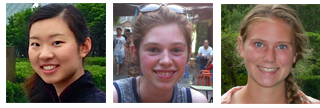MIT Undergraduates Provide “Keys to Empowering Youth” in KEYS STEM Program
From Kiara Cui, Rebecca Gallivan, and Elysa Kohrs
 KEYs is an MIT Society of Women Engineers (SWE) program for 6th to 8th grade girls, held once a month on Saturdays during the school year. The mission of our program is to empower young women in STEM through hands-on activities which focus on engineering and science-based problem solving. We also expose the participants to a vast array of STEM fields through tours and interaction with cutting-edge research laboratories as well as women student and faculty speakers at MIT. Our program also looks to provide strong female role models and mentors to help ignite and maintain these middle schoolers’ interest in science and engineering as well as provide an environment which supports the mentality that STEM is for women, too! We focus on collaboration, application, and leadership skills for our participants and ultimately hope that they take what they learn at KEYs and use it as a tool to spread these thoughts, ideas, and passion to their peers. KEYs is an MIT Society of Women Engineers (SWE) program for 6th to 8th grade girls, held once a month on Saturdays during the school year. The mission of our program is to empower young women in STEM through hands-on activities which focus on engineering and science-based problem solving. We also expose the participants to a vast array of STEM fields through tours and interaction with cutting-edge research laboratories as well as women student and faculty speakers at MIT. Our program also looks to provide strong female role models and mentors to help ignite and maintain these middle schoolers’ interest in science and engineering as well as provide an environment which supports the mentality that STEM is for women, too! We focus on collaboration, application, and leadership skills for our participants and ultimately hope that they take what they learn at KEYs and use it as a tool to spread these thoughts, ideas, and passion to their peers.
Each year, KEYs is coordinated by a group of three to four undergraduates, members of the MIT Society of Women Engineers who love STEM and are excited to share their passion with future female scientists and engineers! Groups of 15-40 middle school girls around the MIT-Cambridge area come to campus for these day-long sessions, which typically consist of a science activity, an engineering design challenge, a female STEM speaker, and a lab demo/tour. Previous activities have explored toy design, Jell-O batteries, robotics and coding with LEGO Mindstorms, crystal snowflakes, squishy circuits, spherification chemistry, space exploration, sustainable city design, healthcare hacks and more. Tours of labs such as the Koch Institute for Integrative Cancer Research, the MIT Media Lab, and the MIT Glass Lab give the girls an experience unique to MIT. Finally, the girls hear about the careers of female undergraduate and graduate students as well as faculty from areas including aerospace, mechanical, chemical, materials and electrical engineering, the sciences and even healthcare and medicine.
Our favorite part has to be watching the girls learn and grow from their time in KEYs. We love seeing them go from being shy and sleepy in the morning to eagerly chatting with their group about how to design a sturdy bridge or what app they want to program by the end of the day. It’s even better to see girls come back session after session, excited about STEM and the possibility of getting involved in it! We’re also thankful for the continued support and encouragement of the girls’ families and the insight they give us to the impact we are able to have on our participants. One parent shared with us how KEYs helped open her daughter’s understanding of what an engineer could be. The parent said, “[When talking about STEM] our conversations often went something like this:
Parent- ‘Had you ever thought about aeronautical or aviation engineering?’
Daughter- ‘No, that sounds boring.’
And then on the drive home from KEYS:
Daughter- ‘Mom, we went into a lab that had a wind tunnel, and it was sooo cool’
In another instance… Parent- ‘How about biomedical engineering?’
Daughter- ‘Yuck, no,’ with that please-change-the-subject tone of voice.
Again, on the way home another afternoon:
Daughter- ‘Guess what? We talked about biomedical engineering today,’ with a smile.”
We hope that in providing these opportunities for girls to experience STEM fields in a positive and encouraging environment, that our participants can move forward with confidence that they can be active participants in science and engineering fields.
Kiara Cui is a senior in the MIT Department of Chemical Engineering.
Rebecca Gallivan is a junior in the MIT Department of Materials Science and Engineering.
Elysa Kohrs is a junior in the MIT Department of Electrical Engineering and Computer Science.
Back to newsletter |